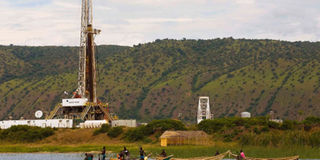Licensing for five oil blocks begins

The next round of oil exploration is expected to increase the current oil stocks. FILE PHOTO
Kampala- Energy Minister Irene Muloni yesterday flagged off the second licensing round for five oil blocks in the Albertine Graben for further exploration.
The new round, officials said, is expected to increase the current oil stock, which stands at 6.5b barrels.
The blocks include Avivi measuring about 1,268km2 in Arua: Omuka (750km2 in Nebbi): Kasuruban (1,285km2 between Buliisa and Packwach): Turaco (635km2 in Ntoroko District) and Ngaji measuring about 230km2 along the borders of Bushenyi, Rubirizi and Ntungamo.
The announcement was made during the East African Petroleum Conference in Mombasa, Kenya, where government showcased the blocks.
Ms Muloni said that some of the blocks such as Ngaji are located in ecologically sensitive areas but given government’s experience - working in the Murchison Falls National Park - detailed environmental and impact assessments will have to be undertaken.
“We have had lessons to learn from the previous licensing round. We have new laws in place and we have adequate data, so we think we are better than we were the last time,” she said.
Ms Muloni also revealed that the Energy Ministry will, in the coming weeks, issue a notice for Request for Qualification (RfQ) for expression of interest and subsequently receive and evaluate bid applications - a process that will take about six months.
Bidding for the oil blocks will take another five months, to be followed by negotiation with the successful bidders, and subsequently issuance of exploration licence in or by December 2020.
The last licencing round in 2015, since the new petroleum regulatory regime came into force in 2013, attracted about 17 prospective oil companies and was concluded in 2016 with only Australia’s Armour Energy Limited and Nigeria’s Oranto Petroleum reaching the final stage; the two were issued exploration licences in 2017.
Armour was issued exploration licence for Kanywantaba oil block in Ntoroko District while Oranto was given Ngassa oil in Hoima District.
The two companies are still at the exploration stage, and it remains unknown if they have since made any significant oil finds.
The two companies are among the five oil companies, alongside France’s Total E&P, Anglo-Irish Tullow Oil, and China’s Cnooc, which are licensed in the upstream. Tullow sold its stake to both CNOOC and Total E&P, and finalisation of the transaction is ongoing.
Attracting small players
The last licencing round was labelled by industry watchers as lackluster after it attracted mainly small and medium-size oil exploration companies, contrary to government’s expectations. But the Energy ministry’s permanent secretary Robert Kasande yesterday expressed optimism in the new round which he said comes at a time when the country’s oil profile has “risen.”
“What you have to know is that our profile has been derisked, first with the amount of work that has been done so far, and by the proposed infrastructure projects such as the East African Crude Oil Pipeline and the refinery,” he said.
According to Mr Honey Malinga, the head of the Petroleum Directorate at Energy Ministry, during the earlier years -1988 and 1989 -Uganda attempted to convince big oil companies such as Shell and Total to come and undertake oil exploration but declined with some joining later.




